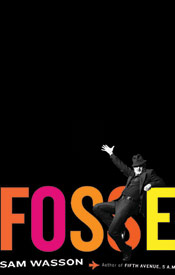(Eamon Dolan/HoughtonMifflin Harcourt, 736 pages, $32)
By Sam Wasson
 To call Sam Wasson’s Fosse a comprehensive account of the life of director/choreographer/dancer/actor/all-around performer Bob Fosse is an understatement. Teetering between exhaustive and exhausting, Wasson brings us the definitive portrait of a complex man and talented director. Written in a jazzy style that often reads more like fiction than biography, the book offers a wealth of interviews with Fosse’s personal friends and coworkers that serve to recreate conversations and life situations so realistically you can almost smell the cigarette smoke.
To call Sam Wasson’s Fosse a comprehensive account of the life of director/choreographer/dancer/actor/all-around performer Bob Fosse is an understatement. Teetering between exhaustive and exhausting, Wasson brings us the definitive portrait of a complex man and talented director. Written in a jazzy style that often reads more like fiction than biography, the book offers a wealth of interviews with Fosse’s personal friends and coworkers that serve to recreate conversations and life situations so realistically you can almost smell the cigarette smoke.
Things were never going to be normal for Fosse. He started out as a teenage burlesque performer before hitting the road, determined to be the next Fred Astaire. But that wasn’t in the cards. Instead, he became a choreographer on Broadway (The Pajama Game, Bells Are Ringing), with a hatful of new ideas about how bodies could move. Wasson spends a good part of the book exploring Fosse’s stage work, but also suggests that his films are his lasting legacy.
Fosse’s work for the screen is brought to life in vivid detail, along with the actors he directed—most notably his muse Gwen Verdon whom he choreographed and danced alongside in George Abbott and Stanley Donen’s Damn Yankees! (1958). He continued staging dance for Broadway and TV specials, which eventually led to his first film as a director, Sweet Charity (1969). In a style that can only be described as authoritarian, Fosse was demanding of both himself and his collaborators. Fueled by an overwhelming insecurity that plagued him his entire life, Fosse’s reach for perfection produced two of the most creative, envelope-pushing films of the 1970s: Cabaret (1972) and All That Jazz (1979).
With these two films, Fosse cleverly reinvented the dying Hollywood musical; he sweetened the cynicism of modernity, while depicting it in a decidedly more realistic fashion. In Lenny (1974), Fosse stripped away his famous “razzle dazzle” for a stark, black and white, nonlinear biopic of the doomed satirist Lenny Bruce. Filmed in fragmented vignettes, the portrait of the self-destructive genius was telling not only of its subject but the director. The film earned Fosse his second DGA Award nomination (Cabaret had been previously nominated; he won a DGA Award for the TV special Liza With a Z in 1972.) "He wanted so desperately to be an artist," writes Wasson, "and that was his tragedy because he already was."
Review written by Carley Johnson